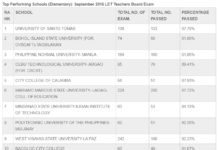In October, the Philippine Center for Investigative Journalism (PCIJ) found over 900 Philippine-linked individuals and companies with offshore accounts in its analysis of the Pandora Papers, leaked documents shared with the International Consortium of Investigative Journalists (ICIJ).
According to the ICIJ, a Washington-based network of 600 journalists and over 150 news outlets from 117 countries, the leaked records in its most expansive exposé yet “reveal that many of the power players who could help bring an end to the offshore system instead benefit from it – stashing assets in covert companies and trusts while their governments do little to slow a global stream of illicit money that enriches criminals and impoverishes nations.”
Filipino journalists from PCIJ and Rappler combed through the files to uncover offshore bank accounts linked to the Philippines.
Artlets lecturer Karol Ilagan, editorial director of the PCIJ, said tax havens and offshore companies should be continuously monitored because they might be abused by corrupt government officials.
“Madami kang makitang accountability issues diyan, kasi as public officials they are supposed to disclose their business interests. If hindi nila dini-disclose, that could be against the law,” she told the Varsitarian.
Ilagan said there could be legitimate reasons for setting up offshore accounts, but such practice has been in question for a long time.
“I would say na may legitimate purposes for setting up offshore accounts or companies, especially if you have business dealings offshore. Kaya lang, at the same time, we have to keep in mind how tax havens have been used and abused by people for the wrong reasons,” she said.
“This is the reason why you have fraudsters, criminals, corrupt officials using tax havens to hide their money and evade paying taxes. Kaya kailangan siya tignan,” she added.
The biggest find is Transportation Secretary Arthur Tugade’s offshore company, which he failed to detail in his Statement of Assets, Liabilities and Net Worth (SALN).
PCIJ and Rappler reported that Tugade did list in his SALN an offshore account containing P57 million but did not specify that it was a company that he and his family owned.
Felipe Salvosa II, head of UST’s journalism program, said a high level of transparency is required of public officials like Tugade.
“That includes your corporate interests, because being in government gives you access to decision-making and important transactions,” he said.
UST journalism alumna Elyssa Christine Lopez, who also contributed to the report, said Tugade did not make a full disclosure.
Tugade defended his offshore account, saying these were valid and legal. His lawyers claimed the report was defamatory.
Lopez told the Varsitarian that the Pandora Papers investigation had yet to be concluded, and reporters were still looking into some unidentified accounts.
Issue on privacy
While a lot of the leaked documents exposed personal information such as passport numbers, addresses and contact details, Ilagan said there was no “breach of privacy” and the reporters behind the report were well aware of privacy laws.
The reports focused on matters of public interest involving public officials, politically exposed persons, and business tycoons, she said.
“Ang tinututukan namin are stories of public interest. Even though may nilabas kaming story, maybe that’s just five percent lang of what we have in the records kasi we can’t obviously write a story about everyone kung wala namang public interest,” Ilagan said.
Ilagan also said the investigation process relied heavily on technology.
“We were given access to all of the data sets and documents, pero we were not given our own copies. We were given access to the platform that organized the documents and data sets, which facilitated our research,” she said.
Ilagan said the reporters were able to go through the enormous data through “radical sharing” and trusting one another.
“Ayun ‘yong crucial in any kind of collaboration, the idea that you are really willing to share, kasi it is only through sharing that you’re able to be on the same page and work on a story… and keeping trust is also important,” she said.
With the leaked documents involving personalities from all over the world and papers in English, Spanish, Russian, French, Arabic, Korean and other languages, Ilagan said collaborating with journalists who understood the local setting was important.
“Say a journalist found this name pero hindi niya kilala or background ng Pilipinas, it might not make sense. Kaya it’s important to do collaborations, because a single organization can’t handle all the data or the documents na mapupunta sa kanya,” she said.
News value
The International Monetary Fund (IMF) in 2019 reported that an estimated $500 billion to $600 billion were placed in tax havens.
Ilagan emphasized that while the rich and the powerful could use tax havens to avoid paying taxes and hide their assets, ordinary people are obligated to remit their taxes to the government.
Ilagan said the Bureau of Internal Revenue and the Civil Service Commission should look into public officials hiding money in offshore accounts.
Lopez said Philippine laws were good but only on paper.
“But we lack proper implementation,” she said.
Ilagan said the “leak” was especially important in times of crisis.
“According to the data we have checked, [the government] loses [between] 300 to 800 billion dollars every year from taxes na dapat naibayad pero hindi naibayad dahil nasa tax havens. That’s money that could have been spent on better Covid-19 response, better delivery of public services for the poor and the marginalized,” she said.


















